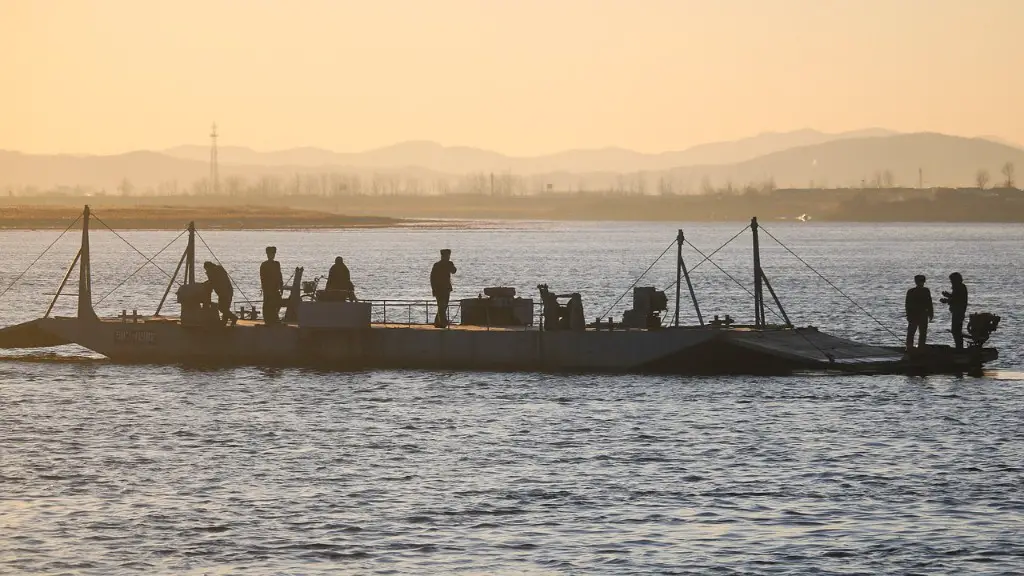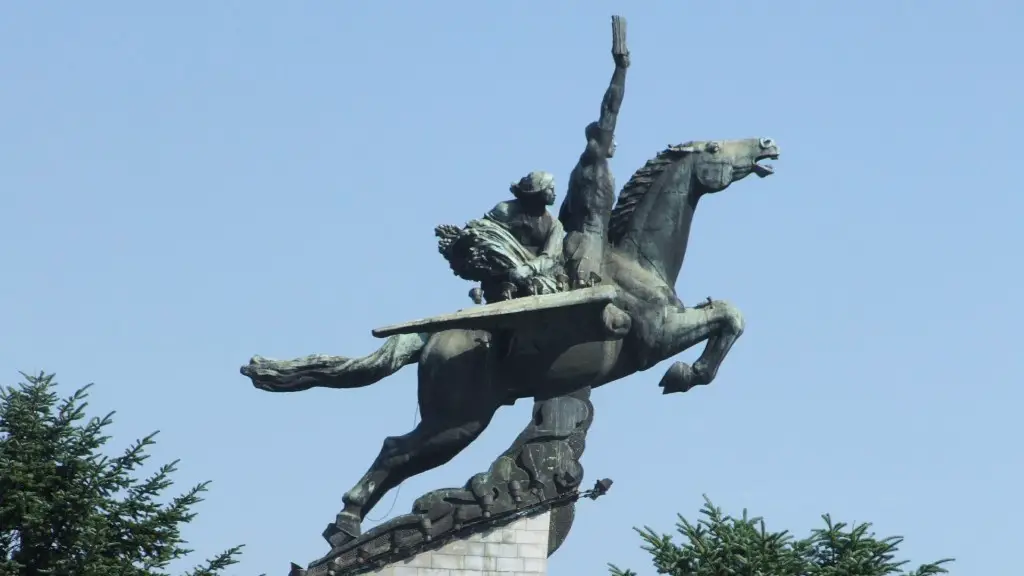Overview of Missile Technology
North Korea has been developing its missile technology for decades, and it is now a nuclear-armed state with a sophisticated arsenal of ballistic missiles capable of reaching other countries. Its missiles can reach several nations in the region, as well as some parts of the United States. The range and accuracy of North Korea’s missiles have improved markedly in recent years and this presents a very real threat to its neighbors in the region, and to a lesser extent the United States.
The most advanced missile system in North Korea is the Hwasong-14 intercontinental ballistic missile (ICBM). This type of missile is designed to carry nuclear warheads and it has been tested at ranges of more than 6,200 miles, capable of reaching the US mainland. The Hwasong-15 ICBM is an even more powerful version of the same missile and it has been tested up to a range of 8,000 miles.
North Korea also possesses shorter-range ballistic missiles such as the Scud and Rodong. These can reach nearby states such as South Korea and Japan, who are North Korea’s closest neighbors. North Korea’s missiles have been tested in the Sea of Japan, which can reach the northern parts of Japan, and the missiles have also been launched over Japan in multiple occasions.
North Korea has not conducted any tests of ICBMs or other missiles capable of reaching the continental United States, but the US believes that the country is technologically capable of doing so. According to US intelligence officials, North Korea is estimated to have between 30 and 60 nuclear warheads, and it is believed to have enough material for up to 100 warheads.
Political Geography
The Korean Peninsula is located in the northern part of East Asia, which is known for its complex geopolitical landscape. The peninsula is split into two countries – North and South Korea – by an imaginary line known as the 38th Parallel. North Korea has a population of approximately 25 million people, and its capital city is Pyongyang. North Korea is a closed society and is subject to international sanctions due to its nuclear weapons program.
South Korea has a population of more than 51 million people, and its capital city is Seoul. South Korea is a prosperous democracy and an important US ally. North Korea has consistently sought to improve its missile technology in order to defend itself against US and South Korean forces.
The US has 28,500 troops stationed in South Korea to defend against any attack from the north. The US and South Korea also conduct regular military exercises in the region, and the US has deployed its THAAD missile defense system in South Korea in order to defend against any impending attack from the north.
US Strategic Posture
The US maintains a strong strategic posture in East Asia to defend itself and its allies against any attack. The US has deployed naval vessels and aircraft in the region, and it has a network of radar and other sensor systems to detect any missile launches. The US also has a robust missile defense system to defend against any missile attacks from North Korea.
The US has imposed economic sanctions on North Korea in an effort to pressure the regime to give up its nuclear weapons program. The US has also adopted a policy of strategic patience, where it is engaging in a diplomatic process with North Korea in order to reach a peaceful resolution of the nuclear issue.
The US also has a strong military presence in the region as a deterrent to North Korea. The US has several bases in Japan, Guam and South Korea, and it also has a contingent of troops stationed in South Korea. The US has also conducted several joint military exercises with South Korea in recent years.
Sanctions and Pressure
The US and its allies have imposed economic sanctions on North Korea in an effort to pressure the regime to give up its nuclear weapons program. These sanctions have been in place for several years and they have severely impacted the North Korean economy.
The US has also proposed a new resolution at the United Nations Security Council (UNSC) to impose more stringent sanctions on North Korea. The resolution seeks to increase financial and economic pressure on North Korea to force it to abandon its nuclear weapons program.
The US has also increased its military presence in the region to deter Pyongyang from taking any hostile actions. The US has conducted joint military exercises with South Korea and strengthened its missile defense system in the region.
Regional Perspectives
The regional geopolitical landscape is complex and this has resulted in some tensions between the various countries in the region. South Korea is an important US ally, but it also has very close ties to China. South Korea seeks to maintain its relations with both China and the US, as it does not want to be dragged into a conflict between the two countries.
China is North Korea’s closest ally, and it has been wary of any US-led efforts to pressure North Korea to abandon its nuclear weapons program. China has supported multiple UN sanctions against North Korea, and it has also proposed a “dual suspension” initiative where North Korea would freeze its nuclear activities in exchange for a suspension of US-South Korea military exercises in the region.
Japan is another important US ally in the region and it has been markedly more hawkish than South Korea on North Korea. Japan has imposed its own unilateral sanctions on North Korea and it strongly supports the US efforts to pressure North Korea to give up its nuclear weapons program.
Impact on Regional Security
The nuclear issue has been a source of tension in the region for decades and it poses a serious threat to regional security. The nuclear issue has resulted in a great deal of international pressure on North Korea, which has been reluctant to give up its weapons program.
The threat posed by North Korea is amplified by its missile technology, and the range and accuracy of its missiles have improved markedly in recent years. North Korea’s missile technology could potentially reach several countries in the region, as well as parts of the United States.
The US and its allies have deployed a strong defensive posture in the region with naval vessels, aircraft, radar and other sensor systems, as well as ballistic missile defense systems. The US has also taken steps to strengthen its diplomatic ties with North Korea and it has engaged in a process of diplomatic negotiations in an effort to reach a peaceful resolution of the nuclear issue.
Implications for Global Security
The North Korean nuclear issue has global implications and it is a major source of concern for the international community. North Korea is believed to have the capability to launch a nuclear missile that could reach the mainland US, and this presents a very real threat to global security.
The global community has responded to the situation by coordinating a unified response. The UN has imposed multiple sanctions on North Korea in an effort to pressure the regime to abandon its nuclear weapons program, and the US and its allies have a strong defensive posture in the region.
The international community has also worked to reduce the tension in the region through diplomatic talks. The US and North Korea have held multiple rounds of talks aimed at finding a peaceful resolution to the nuclear issue, but these efforts have yet to bear any fruit.
Policy Solutions
The international community is seeking to find a peaceful resolution to the North Korean nuclear issue, and the US appears to be open to the idea of a diplomatic solution. The US has repeatedly stated its willingness to engage in a process of negotiations with North Korea to resolve the issue, and it has proposed a “freeze for freeze” proposal where North Korea would freeze its nuclear activities in exchange for a suspension of US-South Korean military exercises in the region.
The US has also proposed a new UN Security Council resolution to further increase economic and financial pressure on North Korea. This is an effort to compel Pyongyang to abandon its nuclear weapons program and reach a peaceful resolution to the crisis.
The international community is also looking to China to play a role in resolving the crisis. China is North Korea’s closest ally and it has supported multiple UN sanctions against North Korea. China can use its influence in Pyongyang to pressure North Korea to abandon its nuclear weapons program.
North Korea’s Interests
North Korea has consistently sought to improve its missile technology in order to defend itself against US and South Korean forces. It has also sought to develop a nuclear arsenal as a deterrent against potential US aggression.
The regime also sees its nuclear weapons program as a source of national pride and legitimacy. This is especially true in the case of the current leader Kim Jong-un, who has made the program a key pillar of his rule.
North Korea is also seeking economic relief from the harsh international sanctions that have been imposed on the country. It is looking for the international community to provide economic aid in exchange for a suspension of its nuclear activities.
North Korea is hoping that the diplomatic process with the US will lead to a resolution of the nuclear issue and economic aid for the country. The regime is also hoping that the US and its allies will refrain from any military action that could jeopardize North Korea’s security.


